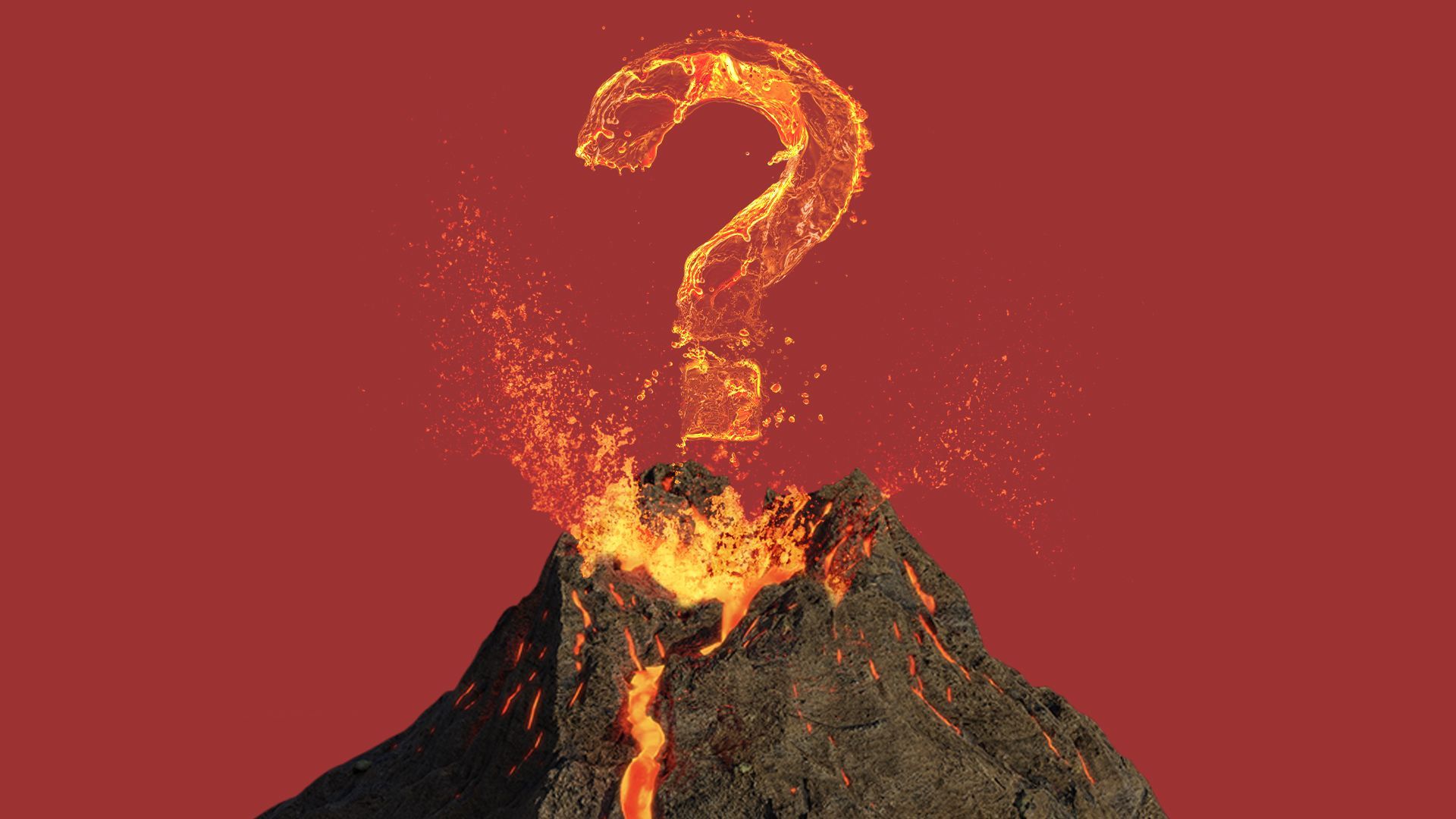
Illustration: Natalie Peeples/Axios
Newfound volcanic activity on Venus hints at the world's past and could give scientists fresh insights into how our Earth — and life on it — evolved.
The big picture: Evidence of geological activity — quakes on Mars, volcanoes on Jupiter's moon Io and relatively recent lava flows on our own Moon — is found throughout the solar system. But the tectonic plates that move on Earth's surface, birthing continents and mountains, are so far the only of their kind known in the solar system.
- Sometimes referred to as Earth's evil twin, rocky Venus is about the same size and composition. Some scientists consider Venus an analog for early Earth — before tectonic plates existed.
Driving the news: Now for the first time, there is direct evidence of an active volcano on Venus.
- Venus has a similar amount of radioactive elements that produce heat as they decay, leading scientists to believe the rocky planet could also be volcanically active. But they hadn't seen direct evidence.
- In a new study, scientists compared radar images taken by the Magellan spacecraft between 1990 and 1992 of a region of the planet where there are two volcanoes.
- They found a vent on one volcano that doubled in area and changed shape over a period of eight months in 1991, suggesting it had erupted. It's still not clear how often these eruptions occur.
The findings make "an unequivocal case" for recent volcanism on Venus, says Suzanne Smrekar, a geophysicist at the Jet Propulsion Laboratory who leads NASA's planned VERITAS mission to Venus but wasn't an author of the new paper.
- She led a recent study that analyzed Magellan data to understand how Venus, without plate tectonics, loses heat from its interior.
- On Earth, heat flowing toward the planet's surface is released, causing the plates to move.
- On Venus, there are no organized tectonic plates. But heat is escaping in places on the surface, similar to what happens where tectonic plates form on Earth's ocean floor, according to the study.
The intrigue: Understanding complex geological activity like plate tectonics could yield clues in the search for habitable planets in the universe.
- "Plate tectonics is a critical component of the Earth system that has played a major role in shaping the conditions allowing life to emerge and thrive on our planet," Tristan Salles, a geomorphologist at the University of Sydney told Axios in an email.
- It allows for the formation of continents and the creation of volcanic islands and oceanic crust that are new habitats for species and a crucible for evolution. Plate tectonics plays an important role in recycling carbon, oxygen and other life-sustaining nutrients.
- It also cycles carbon and water deep in Earth's interior, which regulates the surface temperature of the planet — keeping it "around that of liquid water," Salles said.
But, but, but... Earth is unique in the solar system for other reasons, including its atmosphere, liquid water and the Moon.
- "Even if Venus may not be an exact analog for pre-plate tectonic Earth, studying the planet can still provide valuable insights into the geological processes that shaped our planet's early history," Salles said.
- Without plate tectonics, Venus' surface has preserved "a record of its geological history" that provides "a better understanding of the early geological processes that shaped our planet."
And, the exact role of plate tectonics in the emergence of habitability is debated.
- "It may be that you don't need plate tectonics to develop a habitable environment. It may be that you do need plate tectonics to sustain a habitable environment over 4 billion years," says planetary scientist Paul Byrne of Washington University in St. Louis.
What to watch: Future missions bound for Venus are expected to map the cloudy planet's surface in new detail, allowing scientists to see smaller-scale changes on the world and learn more about the geological activity occurring there.
- The European Space Agency's EnVision mission, expected to launch in the early 2030s will orbit Venus, investigating why that planet and the Earth evolved so differently, despite their similarities.
- NASA's future Venus orbiter VERITAS is designed to map the planet's surface, but the agency confirmed this week that it pulled money from that mission, which was scheduled to launch in 2028, to fund another, delayed mission.
- The space agency is instead planning to launch VERITAS in the early 2030s, though it's not clear when the mission's funding will be restored.

